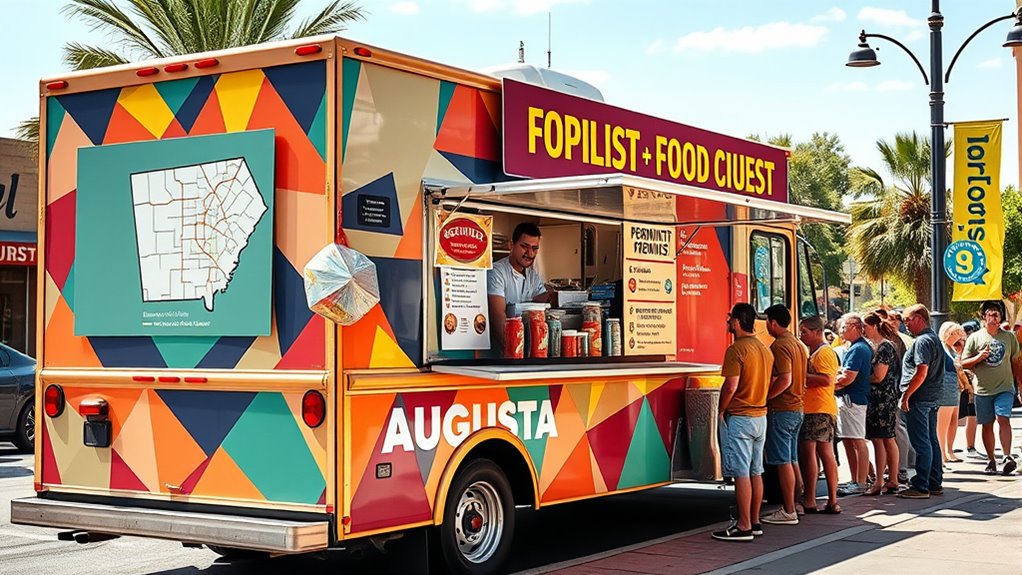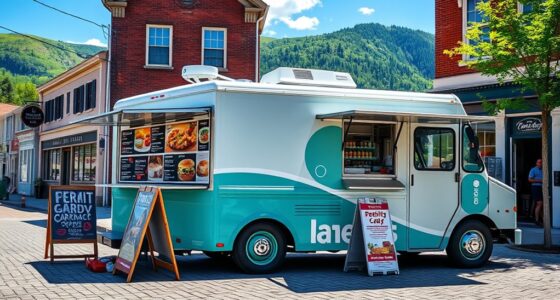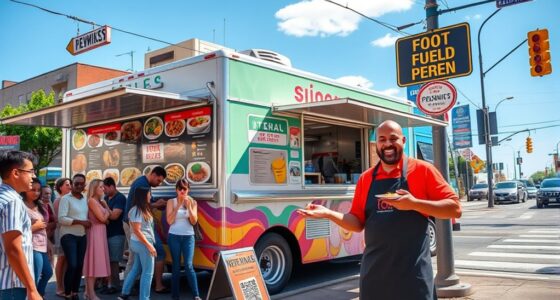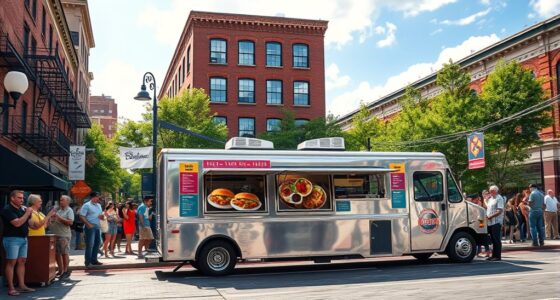To open a food truck in Augusta, Georgia, you’ll need to secure a Business Tax Certificate, complete health and safety approvals, and connect to a licensed commissary kitchen. Startup costs vary from $30,000 to over $175,000, plus ongoing expenses like leasing and staffing. Choose busy locations in downtown or events and develop a compliant menu aligned with local health regulations. Stay ahead with targeted marketing to attract customers—more tips await if you explore further.
Key Takeaways
- Obtain an annual Business Tax Certificate and complete necessary affidavits like SAVE and E-Verify before operating.
- Set up an approved commercial kitchen as your base, meeting Augusta health and safety standards.
- Budget $30,000–$175,000 for truck or trailer purchase, branding, and startup costs; choose high-traffic locations.
- Submit your menu for approval, ensuring compliance with health regulations and proper ingredient handling.
- Promote your food truck via social media, participate in local events, and employ targeted marketing to grow your customer base.
Navigating Permits and Licenses in Augusta
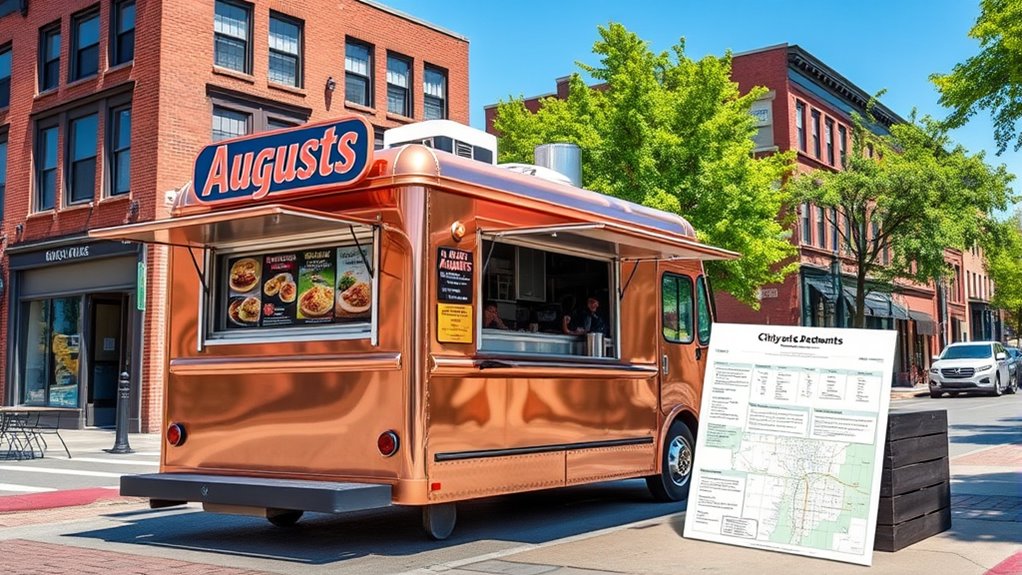
Understanding permits and licenses in Augusta can seem complex, but grasping the key requirements will help you get started smoothly. First, you need an annual Business Tax Certificate from Augusta-Richmond County before operating your food truck. This involves submitting a detailed business tax return with owner info, including Social Security numbers and employee counts. You’ll also complete SAVE and E-Verify affidavits, which can be notarized in-office if needed. Your license approval depends on multiple agencies, like the Health Department and Alcohol Division if applicable. Remember, food trucks can’t operate from residential areas unless under the Cottage Food Program, which allows only non-hazardous foods made at home. Staying compliant with these steps ensures you’re ready to launch your food truck business smoothly. Additionally, all food truck operators in Augusta must connect to a licensed commissary kitchen, which is mandatory for proper sanitation and cannot be substituted with a home kitchen. It’s essential to understand the local licensing requirements to ensure full compliance and avoid potential penalties.
Establishing Your Base of Operations and Meeting Health Standards
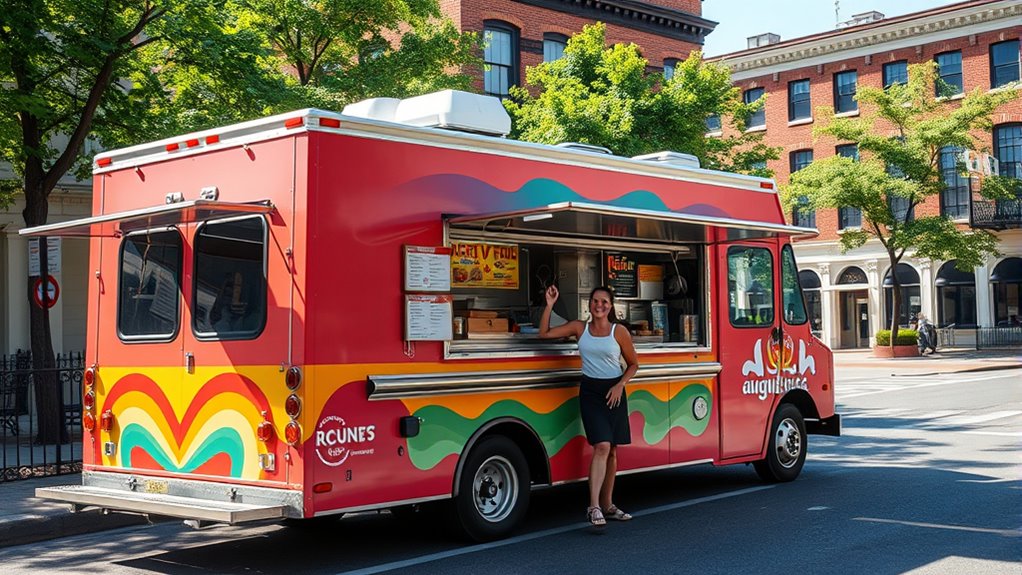
To successfully establish your food truck in Augusta, you must set up a fixed, approved base of operations that meets strict health and safety standards. Your base must be a licensed commercial kitchen or facility, not a residential home, unless operating under the Cottage Food Program for non-potentially hazardous foods. The Augusta-Richmond County Health Department must approve and permit your base before you start. You’ll need to submit your menu, detailed layout plans, and photos of both the base and truck. Permits are issued by the health department of your county of origin and are recognized statewide. Expect periodic and surprise inspections to make certain of ongoing compliance with sanitation, ventilation, fire safety, and waste disposal standards, protecting both your customers and your business. Monitoring for expiration of food products and maintaining proper storage conditions are essential to meet health regulations.
Understanding Costs and Securing Appropriate Locations
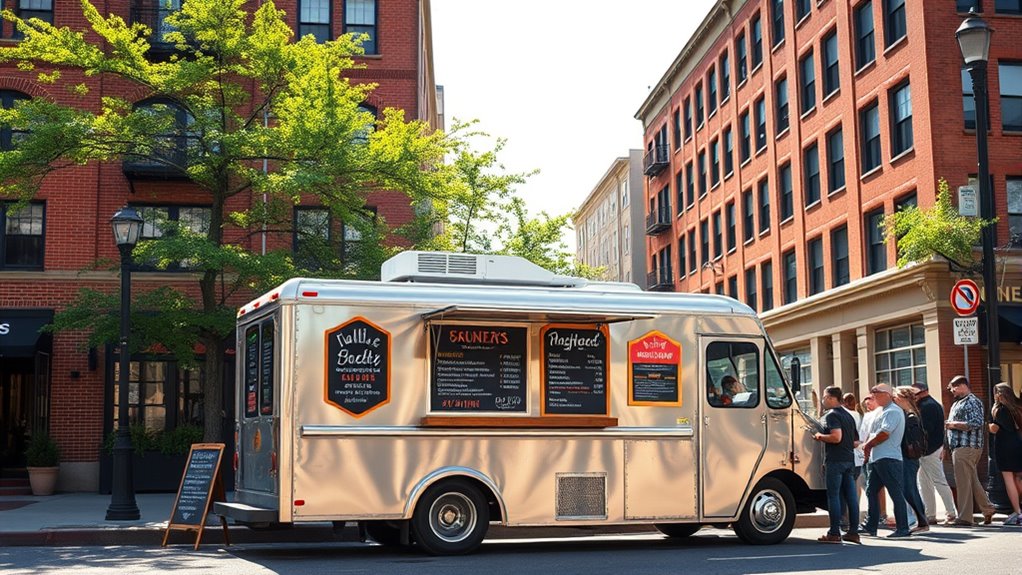
Understanding the costs involved and finding the right locations are essential steps in launching your food truck business. A fully equipped truck costs between $80,000 and $175,000, while trailers range from $30,000 to $80,000. Used trucks can lower initial expenses but may need extra equipment. Additional startup costs, like branding and website design, add $8,800 to $34,000. Leasing a truck costs $1,000 to $5,000 monthly, and inventory runs about $1,000 to $3,000. Operating expenses include commissary fees ($500–$1,200/month), utilities, fuel, maintenance, and permits. Securing strategic locations involves targeting high-foot-traffic areas like downtown Augusta or event venues. Ensure locations meet zoning laws and have utilities access to operate efficiently and stay compliant. Budgeting for ongoing expenses such as insurance and staffing is also vital for sustained success. Additionally, understanding regulatory requirements and obtaining necessary permits can help prevent costly legal issues as you establish your business.
Crafting a Menu That Complies With Local Regulations
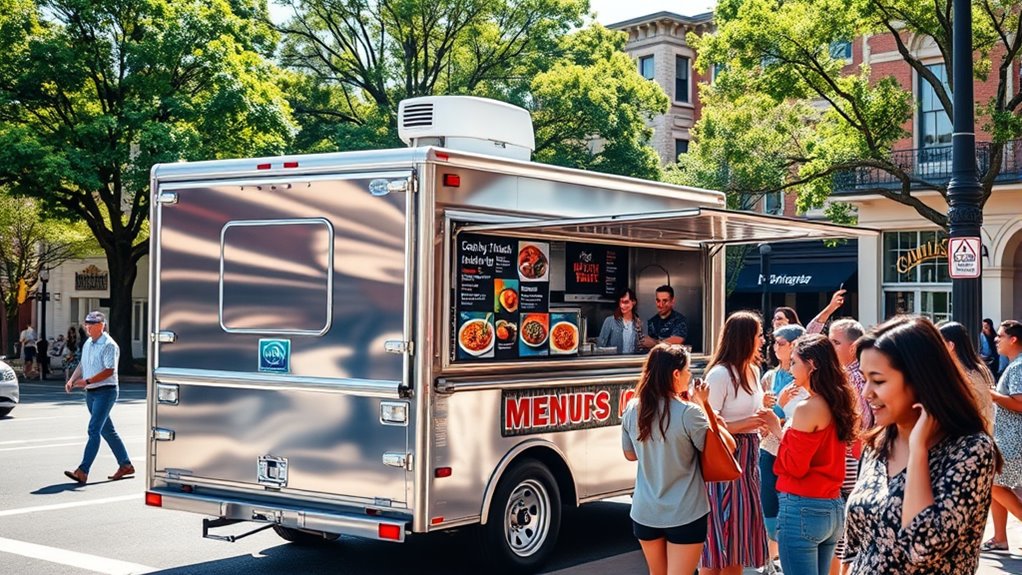
Crafting a menu that complies with local regulations requires careful planning and awareness of specific health and safety standards. You must submit your menu for approval by the Georgia Department of Public Health as part of the permit process. Foods requiring extensive prep need to be prepared at an approved commissary; limited prep can occur on the truck. Your ingredients must be stored and handled per health rules, including temperature controls and preventing cross-contamination. All menu items should suit your truck’s equipment capabilities. Certain raw or high-risk foods, like unpasteurized dairy or raw shellfish, may have restrictions. Remember, all prep and storage happen at a licensed commissary, which must meet local health code requirements. Your menu must also align with Augusta’s ordinances and safety standards to ensure compliance. Additionally, the city’s recent ordinance updates may impose further restrictions or requirements on certain food items or handling procedures to enhance public safety. It is also important to stay informed about food safety regulations to maintain compliance and ensure customer safety.
Effective Marketing Strategies to Grow Your Food Truck Business
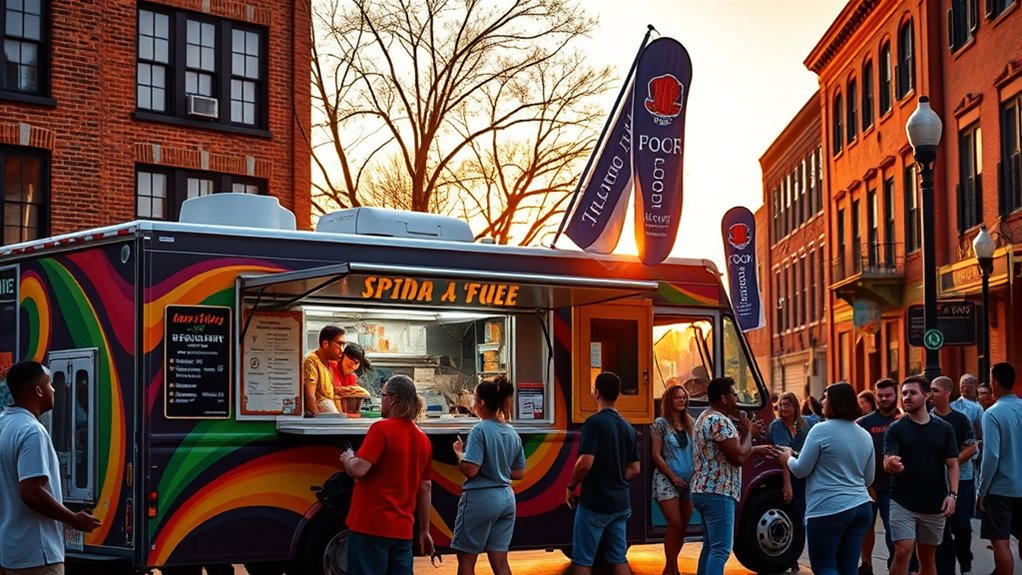
Effective marketing is essential for growing your food truck business and standing out in a competitive market. To boost visibility and sales, focus on these strategies:
Strong marketing boosts your food truck’s visibility and sales in a competitive market.
- Leverage social media, especially Facebook, TikTok, and Instagram Reels, to share engaging content like specials and behind-the-scenes footage.
- Participate in local events and festivals, which can increase sales by up to 50% and expand your brand presence.
- Build customer loyalty with digital punch cards, personalized email promotions, and social media campaigns that encourage repeat visits.
- Use technology like geofencing and AI tools to target nearby customers with promotions, increasing sales by as much as 60%. According to industry data, 80% of food trucks participate in at least 3 festivals or events annually to boost visibility. Incorporating paranormal marketing techniques such as themed promotions or mysterious storytelling can also intrigue potential customers and create buzz around your brand.
Implementing these tactics ensures your food truck stays top-of-mind and attracts a steady stream of loyal customers.
Frequently Asked Questions
How Long Does the Permit Approval Process Typically Take in Augusta?
The permit approval process in Augusta usually takes about 1 to 2 weeks after you submit a complete application. You need to guarantee your paperwork is accurate and includes all necessary details, like zoning and commissary agreements. Keep in mind, delays can happen if documents are incomplete or if inspections are delayed. Planning ahead and confirming all requirements helps speed up the process.
Are There Specific Insurance Requirements for Operating a Food Truck in Augusta?
Think of insurance as the sturdy backbone supporting your food truck journey. In Augusta, you need commercial auto insurance to keep you covered on the road, and general liability insurance to protect against mishaps. You must meet minimum limits—$25,000 per person, $50,000 per accident—and obtain proof of coverage for permits. If serving alcohol, additional policies are required. Staying compliant guarantees your business stays afloat and ready to serve.
Can I Operate a Food Truck on Private Property Without Public Vending Permits?
You can’t operate a food truck on private property in Augusta without public vending permits. Even if you’re on private land, you need a valid Mobile Food Service Permit from the Georgia Department of Public Health, a Business Tax Certificate, and compliance with health and safety regulations. These permits guarantee you’re legally allowed to sell food, maintain health standards, and avoid fines or shutdowns.
What Are the Restrictions on Operating Hours for Food Trucks in Augusta?
You might worry about strict operating hours, but Augusta’s regulations focus more on permits and safety. While there’s no city-wide curfew, you must follow health, fire, and zoning rules. This means operating hours depend on your location, property owner permissions, and safety compliance. You can’t run late into the night without ensuring restroom access and emergency routes are clear. Always get approval from health and fire departments before setting your hours.
How Often Are Health Inspections Conducted on Mobile Food Units in Augusta?
You might wonder how often health inspections happen for your mobile food unit in Augusta. Inspections are unannounced and conducted at the health department’s discretion based on risk and compliance history. Typically, you’ll face periodic inspections when applying for or renewing permits, but they can occur anytime during operation. Maintaining high standards in food safety, cleanliness, and employee hygiene keeps you compliant and helps avoid unnecessary inspections or penalties.
Conclusion
Starting your food truck in Augusta is like planting a seed—carefully maneuvering permits, costs, and locations will help your business flourish. With a well-crafted menu and smart marketing, you’re set to turn heads and satisfy appetites. Remember, success doesn’t happen overnight, but with persistence and passion, your food truck can become a shining star on Augusta’s vibrant streets. Keep your focus sharp, and watch your dream grow like a well-tended garden.
